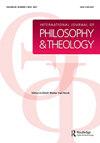Hume’s Dialogues: a natural explanation of natural religion?
IF 0.3
0 PHILOSOPHY
International Journal of Philosophy and Theology
Pub Date : 2021-05-27
DOI:10.1080/21692327.2021.2014938
引用次数: 2
Abstract
ABSTRACT Hume’s Dialogues concerning Natural Religion (1779) describes a philosophical discussion on the validity of the argument from design. What Hume investigates, however, is not the rational grounds of religion, but human nature and its attraction to the idea of design. I argue that the key to understanding Hume’s Dialogues is his conception of the imagination as described in the Treatise. Hume characterizes the human imagination or mind as self-indulgent, with a strong drive to unite perceptions in relations of resemblance, contiguity or causality, often adding fictional constructions to create an easy transition between ideas. Natural religion is a prime example, as the whole universe is united in orderly means-to-ends relations and provided with a familiar cause: something resembling the human mind. This reading of the Dialogues, however, does not warrant the conclusion that Hume provides a reductionist natural explanation of natural religion. Knowing human nature helps to understand religion’s attraction and the attraction of religion helps to understand humans, because it is paradigmatic of who we are. To connect perceptions, construct wholes and create meaning out of chaos is an essential feature of human nature, and a source of great pleasure.休谟的对话:自然宗教的自然解释?
摘要:休谟的《关于自然宗教的对话》(1779)描述了一场关于设计论证有效性的哲学讨论。然而,休谟所研究的不是宗教的理性基础,而是人性及其对设计理念的吸引力。我认为理解休谟对话的关键是他在《论》中所描述的想象的概念。休谟将人类的想象力或思维描述为自我放纵,强烈地将感知统一在相似、邻接或因果关系中,经常添加虚构的结构来创造思想之间的轻松过渡。自然宗教就是一个典型的例子,因为整个宇宙以有序的方式团结在一起,以结束关系,并提供了一个熟悉的原因:类似于人类思想的东西。然而,对《对话录》的解读并不能证明休谟对自然宗教提供了一种简化主义的自然解释。了解人性有助于理解宗教的吸引力,宗教的吸引力有助于了解人类,因为它是我们是谁的典范。连接感知,构建整体,在混乱中创造意义,是人性的本质特征,也是巨大快乐的源泉。
本文章由计算机程序翻译,如有差异,请以英文原文为准。
求助全文
约1分钟内获得全文
求助全文
来源期刊

International Journal of Philosophy and Theology
PHILOSOPHY-
CiteScore
0.30
自引率
0.00%
发文量
12
期刊介绍:
International Journal of Philosophy and Theology publishes scholarly articles and reviews that concern the intersection between philosophy and theology. It aims to stimulate the creative discussion between various traditions, for example the analytical and the continental traditions. Articles should exhibit high-level scholarship but should be readable for those coming from other philosophical traditions. Fields of interest are: philosophy, especially philosophy of religion, metaphysics, and philosophical ethics, and systematic theology, for example fundamental theology, dogmatic and moral theology. Contributions focusing on the history of these disciplines are also welcome, especially when they are relevant to contemporary discussions.
 求助内容:
求助内容: 应助结果提醒方式:
应助结果提醒方式:


